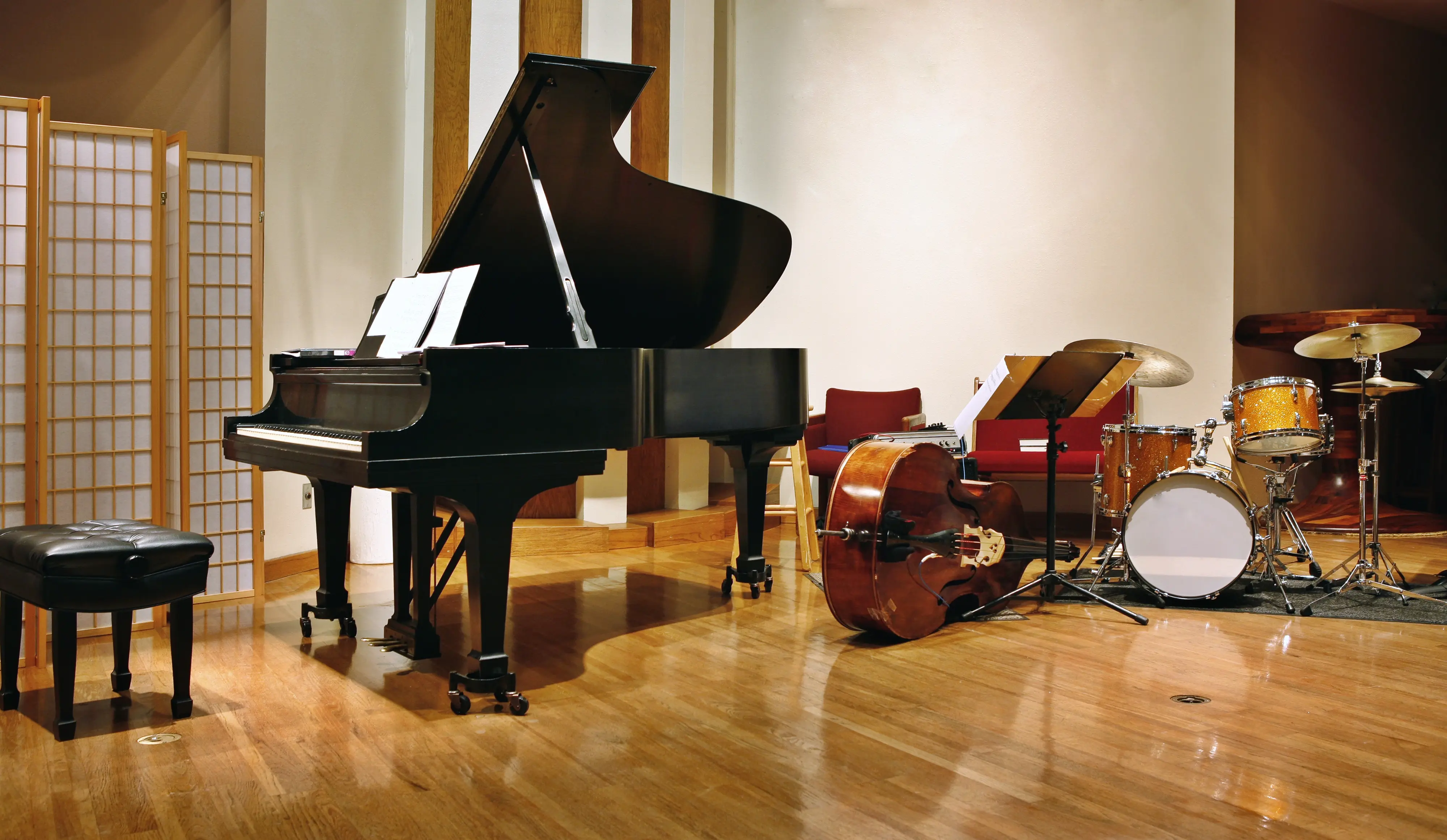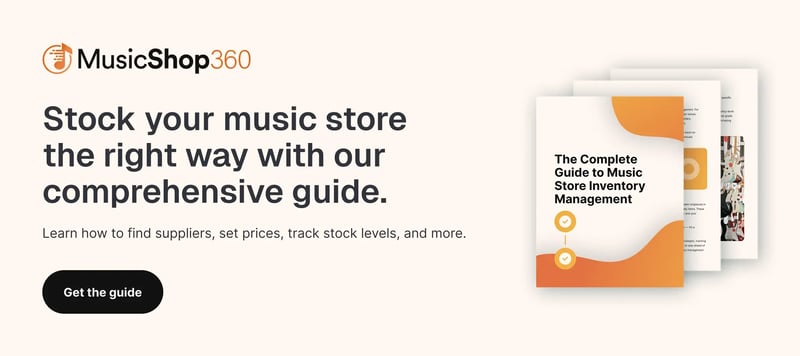
If you run a music store, then you know your inventory isn’t just stock.
It’s a $5,000 guitar waiting for the right buyer. It’s a trumpet coming back from a school rental with a sticky valve. It’s a box of reeds that mysteriously vanished during your last inventory count.
And in the middle of back-to-school season or the holiday gift rush, this inventory can feel like it’s multiplying rapidly. As you sell products, fulfill online purchases, place orders, rent out instruments, or repair gear, your inventory count changes.
With so many business operations to manage, the days of keeping inventory counts with a pen and paper have passed. To protect your margins (and your sanity), you need a smart, flexible inventory management system — typically baked into a quality point of sale (POS) system built specifically for music stores.
In this blog, we’ll break down:
- The unique inventory challenges music retailers face
- The features that truly matter in an inventory management system for music stores
- The best POS systems that help music stores stay organized and profitable
Let’s get started.
Why Inventory Management Can Be Tricky for Music Stores
Inventory in a music shop is a lot more complex than your average retail business.
Before we dive into the key features of an inventory management system for music stores, let’s look at the common challenges shop owners face:
- You’re managing expensive, slow-moving inventory: That $5,000 Les Paul might only sell once a year. So when’s the right time to mark it down? How do you know whether to bundle it, hold firm on price, or promote it?
- You’re juggling tons of product types and thousands of SKUs: You track everything from reeds to amps, with wildly different price points and turnover rates.
- You’re dealing with seasonality: Rental and accessory demand spikes before school starts — and again during the holidays.
- You’re handling rentals, consignments, and trade-ins: Each of these requires different workflows, pricing strategies, and record-keeping. Unfortunately, most generic POS systems can’t always manage them properly.
- You’re risking theft and shrink: Your most valuable items are also your most vulnerable. You need tight controls and smart tracking.
5 Must-Have Inventory Management Features for Music Stores
The right POS system can tackle the complex obstacles you encounter every day. Here are five inventory management features that are especially beneficial for music store owners.
1. Track Inventory Levels, Sales Data, & Serial Numbers
To keep daily operations running smoothly, you need real-time inventory visibility across both your physical store and online channels. A strong inventory management system updates stock automatically after every sale, rental, return, or repair.
For high-value items like guitars, amps, and keyboards, serial number tracking is just as important. With a solid system, you can log unique identifiers and link them to the customer at checkout. This helps prevent theft, supports warranty claims, and facilitates future trade-ins.
When a used Stratocaster sells online, for example, your system automatically updates inventory, logs the serial number, and ties it to the customer — without you lifting a finger.
Over time, tracking sales data also helps you make smarter pricing decisions. If a $5,000 guitar has been collecting dust for months, your POS system can flag it as a slow-mover. This insight gives you the confidence to mark it down or run a limited-time promotion before it takes up too much shelf space or strains your cash flow.
Related Read: Improving Inventory Turnover Rate for Music Stores: 5 Ways
2. Access Vendor Catalogs & Automate Reordering
Modern inventory systems link directly to supplier catalogs — like D’Addario, Yamaha, or Hal Leonard — so you can reorder right from your POS system.
If a product is a hit, you can set an automatic reorder point to help keep your shelves stocked. You can also use sales data and reorder history to plan ahead for seasonal demand, like ramping up beginner violin inventory before back-to-school season or featuring gift-friendly ukuleles ahead of the holidays.
To sort it all, you can group products into custom categories such as “student instruments,” “pro gear,” or “accessories.” This streamlines reordering and helps your team find what they need quickly — even if they’re new to the floor.
3. Simplify Instrument Rentals With Built-In Recurring Billing
If your music store offers instrument rentals, staying organized is essential. You need to know exactly who has each instrument, how long they’ve had it, and what they’ve paid.
A great inventory management system for music stores keeps all of this rental information in one place and makes it easy to track. Comprehensive POS platforms even support recurring billing, so you can automate monthly payments and skip the hassle of follow-up calls.
For instance, say a clarinet goes out in September on a nine-month school rental. Your POS system can automatically bill the customer each month, flag the instrument for inspection midway through the year, and remind your staff to clean and recondition it when it returns in May.
Related Read: A Guide to Online Rental Software for Music Stores
4. Support Instrument Maintenance Services
Instrument maintenance and repair can be meticulous. Some jobs are done in a day, while others might span weeks — especially if parts are backordered or multiple technicians are involved.
A music-specific inventory system helps you stay on top of every repair by logging the instrument, outlining the needed work, assigning the job, tracking its progress, and keeping the customer in the loop.
Imagine a customer drops off a trumpet with sticky valves. Your staff can log it in the POS system with a note like: “Valves sticking — needs oiling. Check for dents.” The job is assigned to a repair tech with a due date of next Thursday. Once the work is complete, the system automatically notifies the customer via text or email: “Your trumpet repair is complete and ready for pickup. Total: $45.”
5. Manage Consignments & Trade-Ins With Ease
When it comes to consignments, a robust POS system tracks who owns the item, how much it’s listed for, and what their commission is if it sells. Some systems even link to vendor catalogs or past sales data, which helps you price items competitively.
Trade-ins work a little differently — instead of a commission, the customer gets store credit. Your POS system can apply this credit at checkout and flag the traded item as a used product, including source details, resale pricing, and notes about its condition or any needed repairs.
In a typical case, a customer trades in a trumpet toward a new one. Your system applies the credit, adjusts the sale price, and logs the trumpet as a trade-in — ready to be cleaned up, retagged, and resold.
And when you’re ready to sell used gear, your POS system lets you list consigned or trade-in instruments on Reverb easily. Your inventory, pricing, and product details sync automatically.
Top 5 POS System Providers for Music Store Inventory Management
These are our top five picks for POS systems that can help you manage your inventory as the owner of an independent music store.
1. Music Shop 360
Best for: Full-service music retailers
Music Shop 360 is an all-in-one POS system built specifically for music stores. It handles everything from selling instruments and tracking serial numbers to managing rentals, repairs, lessons, and consignments.
With built-in access to vendor catalogs, serialized inventory tracking, and automated rental billing, Music Shop 360 eliminates the need for multiple systems. It even integrates with platforms like Reverb, so you can list used or consigned gear online without reentering data.
Standout features:
- Built-in access to music vendor catalogs
- Serialized inventory tracking
- Repair ticket and work order management with customer updates
- Recurring rental billing and contract tracking
- Lesson and class scheduling
- Consignment and trade-in workflows
- Reverb integration for easy online listings
Pricing: Music Shop 360 offers custom quotes for pricing.
Related Read: What Is the Best Music Shop POS System? 5 Top Providers
2. AIM by Tri-Tech
Best for: Multi-department music stores with complex needs
AIM by Tri-Tech is a long-standing POS solution used by specialty retailers, including music stores. It’s modular, so you can add features like rentals, repairs, and class scheduling as your business grows.
Standout features:
- Short- and long-term rental contracts
- Lesson and class scheduling with billing
- Integrated service and repair tracking
- Detailed reporting for multi-department stores
Pricing: Receive a custom quote based on store size and modules selected.
3. Lightspeed
Best for: High-volume shops that want custom reports
Lightspeed is a flexible POS platform for specialty retailers. While not music-specific, it offers tools for inventory management, serialized tracking, service tickets, and detailed reporting.
This software shines for stores with multiple locations or complex reporting needs. You can create custom product tags (e.g., “Used, Electric, Consignment”) and build detailed analytics dashboards without custom development.
Standout features:
- Custom product categories and tags
- Serialized item tracking
- Service and repair work order system
- Multilocation inventory
Pricing: The Basic plan starts at $89 per month, the Core plan starts at $149 per month, and the Plus plan starts at $289 per month.
4. Square
Best for: New or mobile music stores
Square is a simple, affordable POS platform that’s ideal for newer music stores or mobile operations. It’s easy to use and includes basic inventory tools, a free online store, and a mobile-friendly interface.
If you’re selling at pop-ups, teaching lessons in homes, or just starting out, Square gives you a cost-effective way to run your business without needing a complex setup.
Standout features:
- Basic inventory and reporting
- Free online store
- Easy mobile setup for events or home lessons
Pricing: Free POS plan with payment processing fees. The Plus plan starts at $29 per month, with custom pricing for the Premium plan.
5. Shopify
Best for: Online-heavy retailers with a physical storefront
Shopify is a general POS platform that makes it easy to sell online through your website, social media, or mobile. If e-commerce is a big part of your business, Shopify simplifies online sales, inventory tracking, and digital products like lessons or downloads.
Standout features:
- Inventory syncing across online and physical locations
- Real-time reporting and analytics
- App marketplace with music-friendly add-ons
Pricing: The Basic plan starts at $29 per month, the Grow plan at $79 per month, the Advanced plan at $299 per month, and the Plus plan at $2,300 per month. Processing fees apply.
Simplify Your Inventory Management With Music Shop 360
Running a music retail store can quickly become complicated, but with the help of a POS system that includes inventory management, you can simplify the process and lighten the load of running your business.
The right POS system helps you:
- Avoid overstock and stockouts.
- Sell smarter with data-backed insights.
- Track high-value items securely.
- Manage rentals, repairs, and consignments with ease.
Music Shop 360 is an all-in-one, cloud-based POS system built specifically for music retailers. It gives you a clear view of your inventory, automates repetitive tasks, and keeps your store running smoothly online and in person.
Ready to lighten your workload? Request a demo today to see how much simpler inventory management can be.




 by
by 





![4 Music Store Inventory Management Challenges [+ Solutions]](https://musicshop360.com/hs-fs/hubfs/_Blog/Blog%20Featured%20Images/Music%20Shop%20360/1%2029%204%20Music%20Store%20Inventory%20Mangement%20Challenges%20%5BBLOG%5D.webp?width=520&height=294&name=1%2029%204%20Music%20Store%20Inventory%20Mangement%20Challenges%20%5BBLOG%5D.webp)
